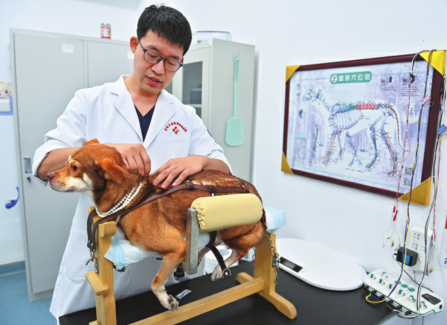TCM offers alternative treatment for pets


When Fubao's owner approached Guo Mengxuan, a veterinarian in Chengdu, capital of Sichuan province, to help treat her paralyzed tabby cat, she had already been told by several experts that her beloved furry feline friend would never walk again.
That's when Guo turned to a traditional treatment that has been used in China to treat animals for thousands of years and that is little known elsewhere — traditional Chinese veterinary medicine, or TCVM.
"The cat had been diagnosed with a severe spinal cord injury and had missed the optimal window for surgery. Other clinics said it would never walk again and would require lifelong assistance when relieving itself," Guo said.
But Guo, trained in both veterinary pharmaceuticals and TCVM, decided to treat Fubao with acupuncture.
"For about three months, the cat received acupuncture three times a week," she said. "Gradually, it regained the ability to stand, walk and even partially control its bladder and bowel functions."
Guo, who practices at Loving Care International Pet Hospital, said a growing number of pet owners in China are turning to TCVM when regular treatments fail.
Similar to traditional Chinese medicine for humans, the use of TCVM as a medical regimen for animals has been practiced in China for over 2,000 years, and focuses on balancing the body's qi, or life energy.
Fubao's case represents the potential of acupuncture and other TCVM therapies in treating a host of animal ailments.
In China, the number of pet dogs and cats has risen steadily since 2017, reaching 124 million in 2023 — a 2.1 percent increase from the year before, according to a report released by Petdata.cn in December.
Guo said Loving Care International Pet Hospital treats an average of 70 pets per day, and sometimes as many as 100.
"About one-tenth of them visit the hospital's TCVM department," she said. "On my busiest day, I handled 17 acupuncture cases."
Guo said that TCVM consultations begin with observation — examining the pet's skin, fur, tongue and breath. "Pets with late-stage kidney disease often exhale a distinct urine-like odor, which is an indicator of kidney failure," she said.
"We also conduct a comprehensive evaluation that includes questioning owners about the pet's daily habits — appetite, water consumption, urinary and bowel patterns, and behavioral changes," she added." Additionally, we can check the pulse of the pets through the femoral artery in their hind legs."
Hu Yusheng, an associate professor at China Agricultural University's college of veterinary medicine, said common TCVM treatments involve acupuncture, herbal medicines and massages.
"TCVM has a long history of treating trauma-induced paralysis and other external injuries. But these days, we are seeing an increasing number of paralysis cases related to congenital abnormalities caused by selective breeding," Hu said.
Take French bulldogs — well-beloved for their adorable appearance — as an example, Hu said.
"The breed is predisposed to inter-vertebral disc disease, which often leads to paralysis. Such cases might seem hopeless from a conventional veterinary perspective. But through TCVM, we can regulate qi, blood flow and organ function to help these animals recover mobility," he said.
"We've successfully treated many such cases — with results that have surprised us and delighted pet owners," he added.
Thanks to advancements in lifestyle, diets and veterinary medicine, dogs are living longer and TCVM offers valuable solutions for maintaining their quality of life in their senior years, according to Hu.
"Many cats and dogs live into their teens or even 20s. The oldest dog I've treated was 24 years old," he said. "In their final days, many pet owners want to give their companions the best possible quality of life."
"A typical example is cancer. When advanced-stage cancer makes surgery or chemotherapy too risky, we focus on regulating qi, improving blood circulation and balancing meridians. This approach allows pets to live comfortably with cancer — and our clinical experience has proved its effectiveness."
Hu said that the most outstanding and valuable characteristic of TCVM is its philosophy regarding life and disease. "It seeks harmony between the animal's body and its environment, and pursues a win-win solution rather than an approach of suppression and resistance," he said. "It is a booming and promising sector that is gaining recognition not only in China, but also overseas."
Tian Zhaosen contributed to this story.





































